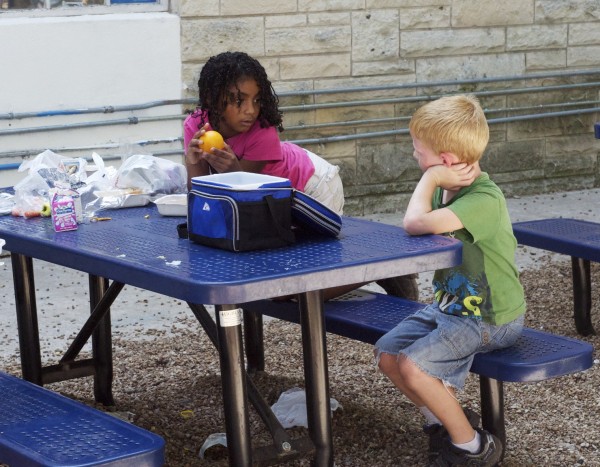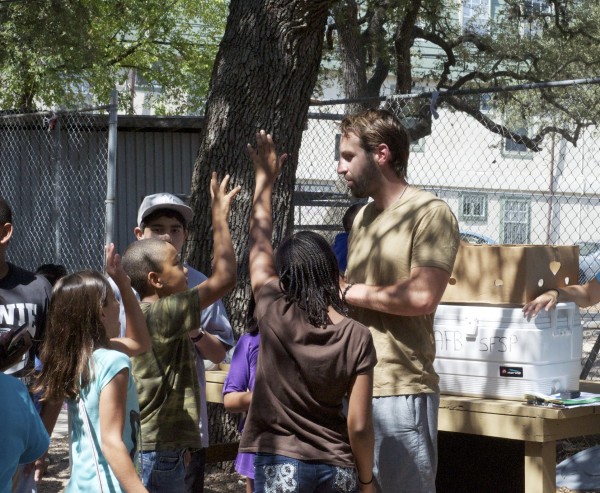Summer can be a glorious time for families in Central Texas. The break from the classroom can mean summer reading clubs, swimming lessons, trips to Schlitterbahn, and the chance to attend summer camp. Not everyone is so lucky, though. For many in Austin, summer means hungry bellies and stretched budgets as kids lose access to the free or reduced-price meals they receive during the school year.
More half of the students in the Austin Independent School District (AISD) qualify for free or reduced-price meals. When kids are not eating those meals at school, parents must come up with funds for food at home or else let kids go hungry. The Summer Food Service Program (SFSP) provides relief in the form of free prepared meals to children and youth during the summer. The federally-funded SFSP seems like a win-win at first glance. Kids get a free meal or two each day, parents’ pantries last a little longer, and local economies get a boost from the federal aid dollars.
But there’s no such thing as a free lunch. Although the Federal Government pays for SFSP food costs, there is no money earmarked to actually administer the program. In Texas this burden is passed on to thousands of sponsor agencies like public schools, summer camps, and nonprofit organizations who elect to implement the SFSP meal program at the grassroots level.
Accessing those federal food dollars is no easy feat. Once an SFSP sponsor has submitted the 57-page application to qualify for food reimbursement, they must work with local health authorities to ensure that lunches are up to code. Then they’re on the hook to prepare and distribute food, organize volunteers, provide transportation and pay for utilities. Those costs are often more than qualified sponsors, like public school districts, can handle. When they can’t afford to offer the SFSP meals, kids are left hungry.

Children eating a free lunch at the Boys and Girls Club of South Austin this week. The Boys and Girls Club of the Austin Area and Capital Area Food Bank are working together to provide free meals to children in South Austin all summer long.
The Capital Area Food Bank (CAFB) helps fill these gaps in Central Texas so that more children get more meals, and so that Austin can maximize the availability of federal funds. This summer CAFB is hosting SFSP meal sites at places like Boys and Girls Clubs, YMCAs and Extend-a-Care that offer summer programming for children from low-income families. The childcare nonprofits take care of gathering the kids, serving the meals, and staffing the childcare, while the CAFB helps manage the SFSP application process and other logistics. Through the partnerships, free summer meals are usually part of larger neighborhood enrichment programs, creating an outreach presence in Austin that is greater than the sum of its parts.
This year CAFB expanded the number of its meal sites from 23 to 30, thanks to a $20,000 grant from the ConAgra Foods Foundation. This grant is part of the Foundation’s Hunger-Free Summer program, a five-year partnership with Feeding America, in which ConAgra will award $10 million of grant funding to Feeding America’s partner food banks. Over the five year period, annual micro-grants like the one awarded to CAFB will help pay for meals at the grassroots level, while multi-year research is funded at the national level. Individual food banks send data to researchers with the idea that in the end everyone will learn efficient and successful ways to manage SFSP programs in their own communities.

Country singer Josh Kelley helps hand out lunches to children at the Boys and Girls Club of South Austin. Kelley visited the organization as part of the ConAgra Foods Foundation's Hunger Free Summer Tour, a media tour designed to raise awareness about hunger issues.
Another goal of the campaign is to raise awareness of hunger issues through the “Hunger Free Summer Tour.” This year country singer Josh Kelley is pounding the pavement, traveling to five American cities as part of the media tour, where he will talk with the press and visit food banks that received grant funding. He visited the Boys and Girls Club of South Austin on Wednesday to visit with children there and help pass out lunches.
“As a new dad it is hard to imagine that millions of kids face hunger and don’t know where they will get their next meal,” said Kelley. “I’m proud to be visiting sites like the Boys and Girls Club of Austin Area to spend time with the kids, and also celebrate the volunteers and staff members who are making great strides in an effort toward ending child hunger.”
Kelley hung out at the Boys and Girls Club for a long time on Wednesday, playing basketball, making crafts, snacking with the kids and even giving a concert for them. While these happy moments helped to make coverage of a bleak issue more palatable, one hopes that once the spotlight is gone Austin media will continue to explore what summer means to the kids who can’t get a free lunch to fill their tummies.
To find out where you can get access to Summer Food Assistance in Austin, visit the Capital Area Food Bank website or dial 2-1-1 and ask about Summer Food Assistance.
